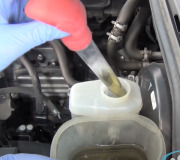Two possibilities come to mind. Both have to do with bleeding the new lines. If you pedal bled the system, did you press the pedal all the way to the floor? If you did, there could be debris blocking the lines near the master cylinder. Normally the pistons and seals don't travel in the bottom halves of the master cylinder bores. this video will how you how.
https://youtu.be/OYmzl1LSfX0
Corrosion and debris build up there. By pressing the pedal to the floor during bleeding, (or when a hose pops), the seals can tear when they run over that crap. That will cause a sinking pedal when you hold steady pressure on it. Whether that happens or not, some of that crap could be knocked loose and sent down the lines. I think that's a stretch, but heck, . . . haven't you already looked for the simple or common stuff?
Another often overlooked problem has to do with brake fluid contamination. The slightest hint of petroleum product in the fluid will cause rubber parts to swell. Seals in the master cylinder will grow past the ports to the reservoir trapping the fluid. As the brakes heat up, the expanding fluid can't release back into the reservoir so pressure builds up that applies the brakes even harder. You might see the seal under the reservoir cap balloon up and feel soft and mushy. The only proper fix is to replace ALL rubber hoses and ALL parts containing rubber seals or o-rings, then flush and dry the steel lines. Any rubber part not replaced will leach contaminants back into the new fluid and will contaminate the new rubber parts. If this is suspected, the calipers will release when the bleeder screws are opened. This takes about a week to show up after the fluid became contaminated.
Common causes of conntaminated fluid include resetting the bladder seal in the reservoir cap with oily fingers, and using penetrating oil on hydraulic fittings. A less common, but still lethal cause is wiping out a funnel that was used for engine oil or transmission fluid, then using it for brake fluid. The slight residue is enough to cause problems.
To show my students the importance of keeping brake fluid clean, I put two wheel cylinders in two beakers half filled with brake fluid, then added one drop of engine oil to one of them and stirred it up. After a week, the contaminated one had grown by about 10 pecent and was soft and mushy. The rubber used for brake parts is definitely not compatible with petroleum products.
If this doesn't sound like it fits your problem, holler back for some more ideas.
caradiodoc
SPONSORED LINKS
Monday, March 15th, 2021 AT 10:33 AM



